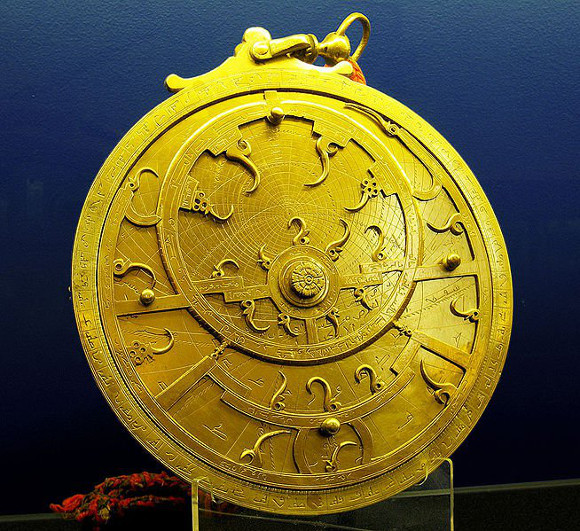
By: IINA
Source: http://twocircles.net/2014jan22/inventions_1001_celebrate_muslim_contributions.html
Jeddah : While Europe was grappling through the “Dark Ages,” the Muslims were thriving and experiencing what was for them, “the Golden Ages.”
They made groundbreaking discoveries and inventions in areas of astronomy, mathematics, medicine, mechanics, and more; they greatly influenced the lives of people and served as a foundation for educating generations for years to come. How many people are aware that the camera was first invented by a Muslim or that the very first clock was designed by a Muslim? The world today is unaware of the Muslim heritage which is rich in scientific discoveries.
Centuries later, scientists from around the world built their knowledge on the basis laid down by these ancient civilizations and they made their own inventions that left their mark on our world.
To showcase 1,000 years of scientific, technological, and cultural achievements reached by inspirational men and women from the Muslim civilization that spread from Spain to China from 7th century onwards, 1001 Inventions has been founded. 1001 Inventions is an award-winning educational organization, promoting an international effort to celebrate the contributions of the Muslim civilization, engaging over 70 million people worldwide. Working with high profile partners and the world’s leading academics, 1001 Inventions produces exhibitions, short films, live shows, books, and classroom learning materials that are being used by hundreds of thousands of educators around the world.
The 1001 Inventions Exhibition has arrived in Jeddah and is already inspiring and enlightening the hearts and minds of thousands of visitors. The Jeddah exhibition is being hosted as part of Saudi Aramco’s Knowledge Enrichment programs that aim to spark the interest of young people in Saudi Arabia to pursue careers in science and technology. The Knowledge Enrichment program is supported and organized by King Abdul Aziz Center for World Culture. With a wide range of interactive technologies, displays, models, high tech games, and a 3D science theater, young visitors are learning with a pleasant surprise that the structure and function of the circulatory system was first uncovered and explained by a Muslim, Syrian physician, Ibn Al-Nafis.
He was the first to describe the constitution of the lungs, bronchi, coronary arteries, and the exchange of gases in the blood, and to elaborate how the coronary arteries delivered oxygen to the cardiac muscle — which was as early as 1200. In an entertaining way that caters to youngsters’ desire to see, hear, touch, and interact, boys and girls will learn the stories of great heroes; Ibn Sina who was among the first to discover anesthesia, which made long surgeries possible. Zakariya Al-Razi, known as the father of Islamic medicine, made many leaps in chemistry, surgery, and the establishments of hospitals.
The Muslim engineer, Ismail Al-Jazari, was the first to successfully develop and build an advanced water pump and a sophisticated water supply system driven by gears and hydropower. A pipeline system was used to deliver water to mosques and hospitals from a water source which was located at the bottom of a hill in the 10th century. Ibn Yunus Al-Masri discovered the pendulum, which had value centuries later in developing clocks. Ibn Al-Haytham, born in Iraq, was most known for his outstanding achievements in physics and optics; he was the first to discover that light travels in straight lines. He built Al-Bayt Al-Muzlim, or a dark room which was the prototype for the modern camera.
His revolutionary finding was that rays of light from an object passes through a tiny hole in the dark room and projects an inverted image of the object on a wall inside the room and this image could be permanently captured – the world’s first camera. The 1001 Inventions Exhibition has replicated Al-Haytham’s dark room so visitors can have a real-life experience of what his camera was like and how it worked. Al-Khawarizmi was a great Muslim mathematician who introduced the use of Indo-Arabic numerals that, over time, came to be known as algorithms.
His introduction of the zero as a placeholder in equations paved the way for the development of the decimal system.
His most significant contribution was his book, Hisab Al Jabr wal-Muqabalah, which defined the study of algebra.
Visitors of the exhibition in Jeddah have the opportunity to enjoy six interactive zones within the huge exhibition.
The exhibition reproduces some of the most astounding inventions of the Golden Ages and demonstrates the impact that the Muslim civilization has had on the way we live our lives today. Guests enter the exhibition after watching the award-winning short film, “1001 Inventions: The Library of Secrets.” The 10-minute movie follows the journey of young children studying the era of the historically mislabeled ‘Dark Ages’, only to find that the Muslims during this period were in their ‘Golden Age’.
This film gives guests a better understanding and appreciation when they start exploring the main exhibition. The 1001 Inventions exhibition in Jeddah is open now and until February 13, daily from 5:00 pm until 11:00 pm on weekdays and until 12:00 midnight on weekends. The exhibition is located on a large-scale custom built venue beside the Saudi Aramco Training Center. Global partners for 1001 Inventions include the Foundation for Science, Technology, and Civilization and Abdul Latif Jameel Community Initiatives.



